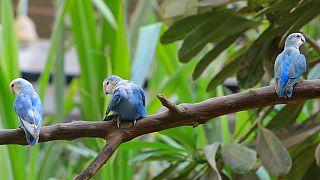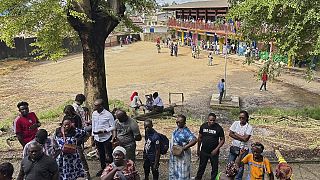Gabon
Gabon is counting on tourism to help save one of its native species, the mountain gorilla.
There are two families of great apes in the country that are accustomed to humans. One lives in the Loango National Park, the other lives in the Moukalaba Doudou National Park, 600 kilometres south of the capital, Libreville.
But approaching these creatures in the wild takes years of hard work.
"Gorillas are wary of humans so they gradually gain confidence. As you can see now, Kamaya is sitting calmly, he is lying down, he is sleeping, he is trusting. This is following years of work we have done, years of really hard work to reach this point", said Hermann Landry, an ecotourism guide.
The Loango park is home to nearly 1,500 gorillas.
Only around 20% of the country's population live in this national park.
"Through tourism, it allows bringing needed funds into the park's system to protect the gorillas and actually all other species through them as well. They are like a flagship species where they are very charismatic and they help protect species through protecting them also", adds Loango Gorilla Project manager, Koro Vogt.
The biggest threat great apes face is poaching, disease and loss of habitat.
The development of ecotourism is at the heart of the government's strategy to promote conservation.
"The species is still on the verge of extinction, if we don't do something. So helping gorillas to grow accustomed to our presence, the tourists. They come to see (the gorillas) and they will then serve as ambassadors of their protection" concludes the ecotourism guide.
Gabon is following the example of Rwanda and Uganda where mountain gorillas were almost extinct before funds from tourism helped to double their numbers in three decades.











Go to video
African elephant Pupy arrives in Brazilian sanctuary after 30 years in Buenos Aires zoo
Go to video
South African orphanage rehabilitates injured predator birds
Go to video
African conservationists saving vultures from going extinct
01:49
Tourists, wildlife attempt amicable co-existance at Cape Town harbour
00:59
Young gorilla rescued from plane cargo recovers in Istanbul zoo
01:10
Prince William honors conservation heroes at Tusk Awards in London